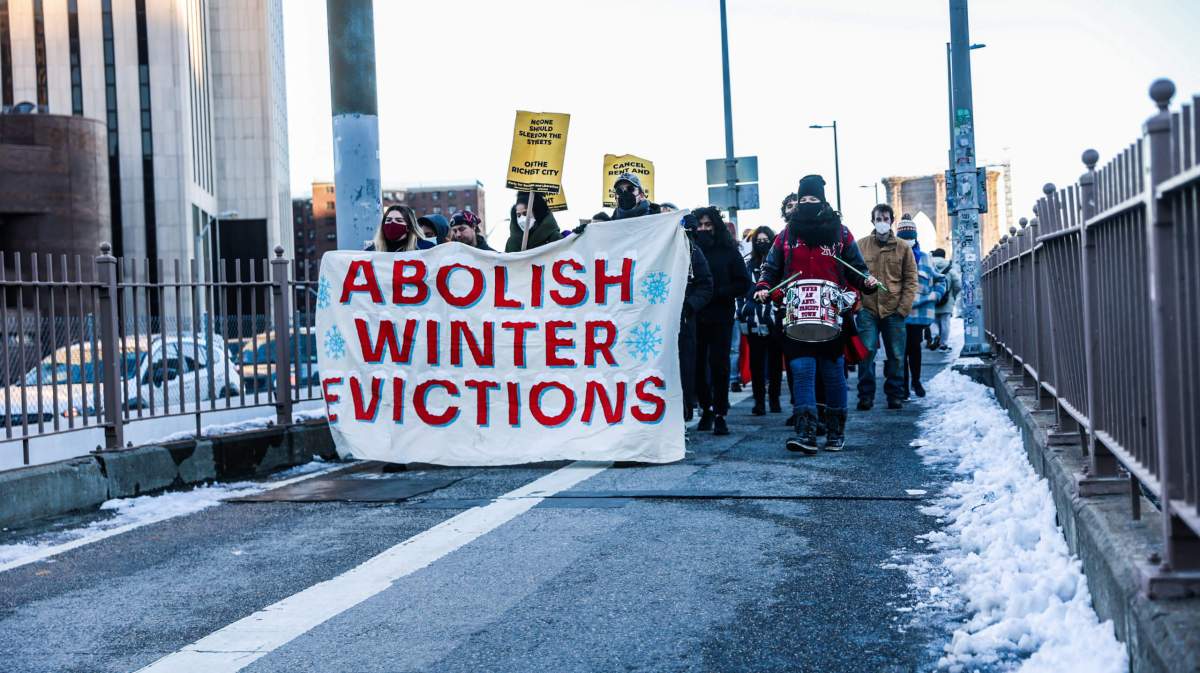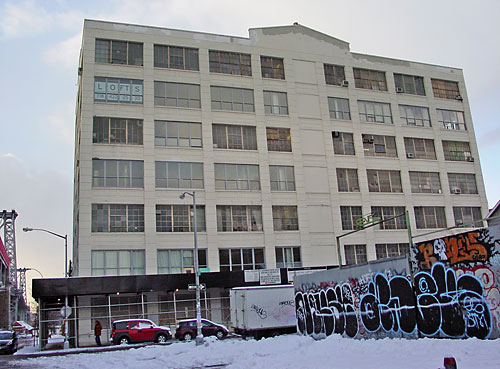Tenants and housing activists marched through Brooklyn and Manhattan on Saturday, calling for an extension to the eviction moratorium and a blanket end to cold-weather evictions in New York City.
The moratorium was put in place in March 2020, as New Yorkers across the state had their working hours slashed, or lost their jobs altogether, as the first wave of the pandemic took hold. Even so, tenants — including more than 2 million who rent in New York City — have held their breath as the moratorium, which was first set to expire last June, has been extended a few months at a time — often just days before its expiration.
In September, Gov. Kathy Hochul extended the moratorium one more time, from Oct. 1, 2021, to Jan. 15. 2022. Days away from the expiration date, Hochul seems inclined to let the moratorium end, even as COVID rates in the city skyrocket and wintry winds blow in.
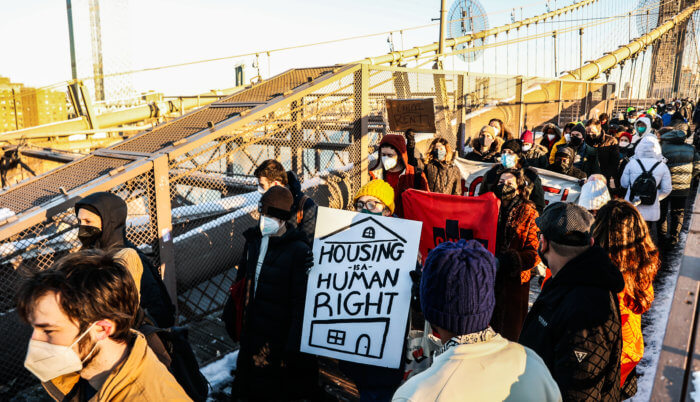
“I think that this is a concerted effort by the rich and powerful, more than anything else,” said Joel Feingold, a co-founder of the Crown Heights Tenants Union, on why Hochul seems likely to finally let the halt on evictions lapse. “It’s really part of a concerted push not just to force people back to work for profits sake, health be damned, but also to chip away at some of the victories that working class tenants have made in building a little bit of a sense of democracy during this pandemic.”
The Crown Heights Tenants Union, the Flatbush Tenant Coalition, the New York City chapter of the Democratic Socialists of America, and the Party for Socialism and Liberation gathered outside Brooklyn Housing Court and marched across the Brooklyn Bridge to Manhattan Housing Court, chanting “I believe that we will win” and stopping outside the Court Street office of the law firm Slochowsky and Slochowsky, who provide legal representation to some of the city’s eviction-hungry landlords.
Included on that list is Demetrios Moragianis, who owns six buildings in Brooklyn and has sued more than 400 tenants for eviction during the pandemic, according to data maintained by Right to Counsel NYC. Moragianis has successfully evicted more than 50 tenants since 2017. Moragianis also owns The Astra, a new mixed-affordability building on Gates Avenue in Bedford-Stuyvesant, by way of The Astra at Gates Avenue, LLC.
The coalition is asking to extend the eviction moratorium until June 2022, and to put a permanent end to evictions during the city’s “heat season,” when landlords are required to turn on the heat in their buildings, from Oct. 1 to May 31 each year, following the lead of cities like Seattle.
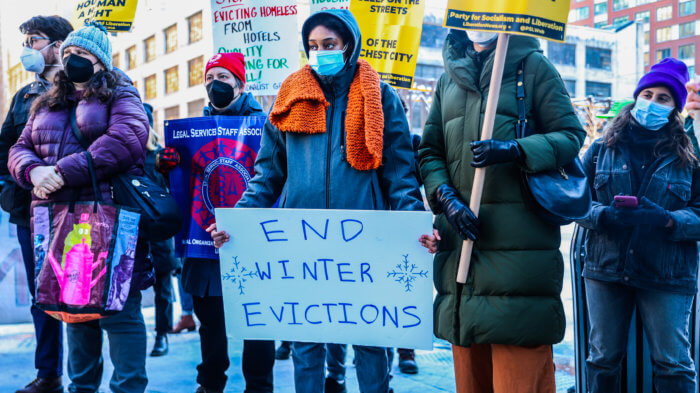
Advocates and lawmakers are pushing hard to pass “Good Cause” eviction laws, which would give tenants the right to a lease renewal, cap large rent increases, and prevent landlords from evicting tenants without an order from a judge. Some have stopped fighting to extend the moratorium in favor of waging a legislative battle to pass Good Cause.
“I understand why people want to move toward Good Cause eviction,” said Amadi Ozier, an organizer with the CHTU. “The Crown Heights Tenants Union believes that Good Cause eviction protection is important, but doesn’t go far enough to protect the tenants who are going to be evicted after Jan. 15.”
More than 200,000 people are on the docket to be evicted immediately once the moratorium is lifted, Ozier said, and Good Cause wouldn’t protect most of them, because the law does not protect tenants who have missed rent payments. Tenants in five buildings represented by CHTU, including at 22 Hawthorne St. in Prospect Lefferts Gardens and 1237 Dean St. in Bed-Stuy are particularly vulnerable, Ozier said, and they represent a small number of thousands who could be on the chopping block.
The Tenant Safe Harbor Act, which passed last year and gives tenants facing eviction due to nonpayment of rent a legal defense in court, isn’t much help either, Feingold said. It does not prevent eviction proceedings from going forward, and it’s not clear when the law’s protections will end.
“We need to abolish winter evictions forever, we need to abolish evictions without cause forever, and we need to clear these 250,000 eviction cases from the housing court docket,” he said.
Eviction proceedings are moving forward in some cases, he said, including for members of the CHTU, where landlords have challenged a tenant’s “hardship declaration,” which explains their financial difficulties and how they’re related to the pandemic.
In one instance, Feingold said, a landlord fired his superintendent, whose partner has an autoimmune disease, during the pandemic, and challenged their hardship declaration — despite causing the financial hardship himself.
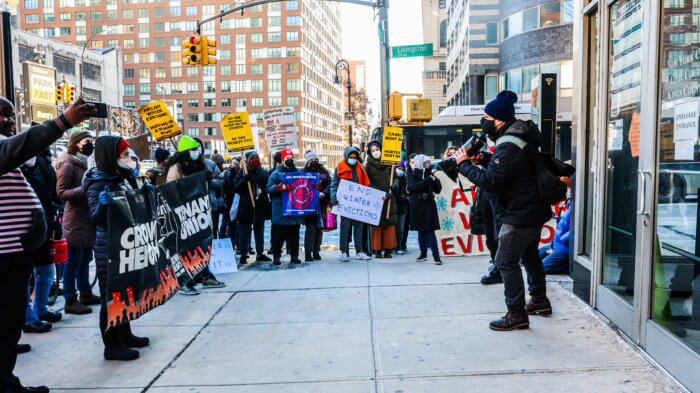
In November, applications for the Emergency Rental Assistance Program, which had been allotted only $2.4 billion from the federal government, closed to most New York City residents. After a slow and difficult rollout, the Biden administration seems unlikely to allot more money to the program, and New York received only $27 million in additional funding after requesting $1 billion.
Four borough presidents, including the newly-anointed Brooklyn beep Antonio Reynoso, have joined forces to call for Hochul to extend the eviction moratorium. Last week, a coalition of faith leaders from across the state wrote to Hochul, Mayor Eric Adams, and other government leaders, including Brooklyn state Sen. Brian Kavanagh, who chairs the senate’s housing committee, imploring them to enact Good Cause and to end winter evictions before the 15th.
CHTU is planning another protest on Wednesday, when they’ll be marching to Billionaire’s Row to hold the city’s wealthiest landlords accountable, Feingold said, and another on Friday morning, the day before the moratorium expires.
“I understand that there’s fatigue of constantly asking for extensions to the eviction moratorium,” Ozier said. “But I think we’re going to continue to ask for extensions as long as there’s a national and global crisis that impacts workers’ ability to pay their rent.”
“I don’t know what June is going to look like, but if June looks like January, then we’re going to continue to push for an eviction moratorium.”


